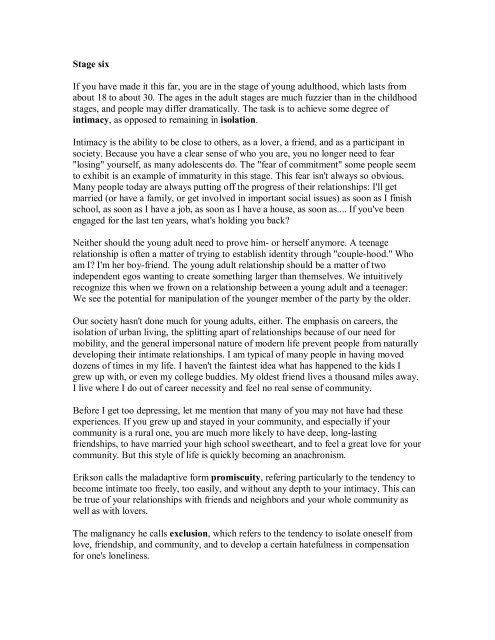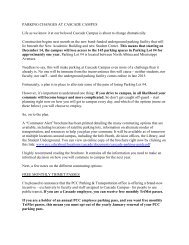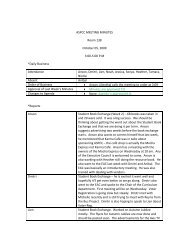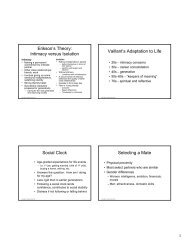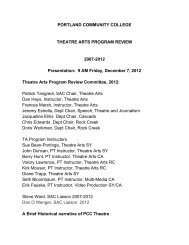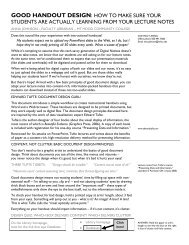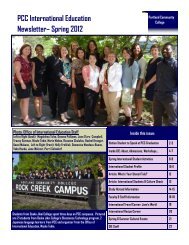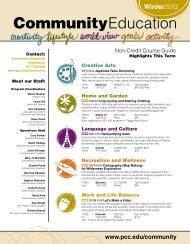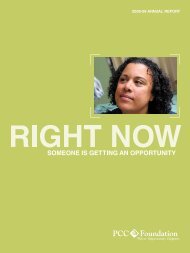erik erikson - pcc - Portland Community College
erik erikson - pcc - Portland Community College
erik erikson - pcc - Portland Community College
You also want an ePaper? Increase the reach of your titles
YUMPU automatically turns print PDFs into web optimized ePapers that Google loves.
Stage six<br />
If you have made it this far, you are in the stage of young adulthood, which lasts from<br />
about 18 to about 30. The ages in the adult stages are much fuzzier than in the childhood<br />
stages, and people may differ dramatically. The task is to achieve some degree of<br />
intimacy, as opposed to remaining in isolation.<br />
Intimacy is the ability to be close to others, as a lover, a friend, and as a participant in<br />
society. Because you have a clear sense of who you are, you no longer need to fear<br />
"losing" yourself, as many adolescents do. The "fear of commitment" some people seem<br />
to exhibit is an example of immaturity in this stage. This fear isn't always so obvious.<br />
Many people today are always putting off the progress of their relationships: I'll get<br />
married (or have a family, or get involved in important social issues) as soon as I finish<br />
school, as soon as I have a job, as soon as I have a house, as soon as.... If you've been<br />
engaged for the last ten years, what's holding you back?<br />
Neither should the young adult need to prove him- or herself anymore. A teenage<br />
relationship is often a matter of trying to establish identity through "couple-hood." Who<br />
am I? I'm her boy-friend. The young adult relationship should be a matter of two<br />
independent egos wanting to create something larger than themselves. We intuitively<br />
recognize this when we frown on a relationship between a young adult and a teenager:<br />
We see the potential for manipulation of the younger member of the party by the older.<br />
Our society hasn't done much for young adults, either. The emphasis on careers, the<br />
isolation of urban living, the splitting apart of relationships because of our need for<br />
mobility, and the general impersonal nature of modern life prevent people from naturally<br />
developing their intimate relationships. I am typical of many people in having moved<br />
dozens of times in my life. I haven't the faintest idea what has happened to the kids I<br />
grew up with, or even my college buddies. My oldest friend lives a thousand miles away.<br />
I live where I do out of career necessity and feel no real sense of community.<br />
Before I get too depressing, let me mention that many of you may not have had these<br />
experiences. If you grew up and stayed in your community, and especially if your<br />
community is a rural one, you are much more likely to have deep, long-lasting<br />
friendships, to have married your high school sweetheart, and to feel a great love for your<br />
community. But this style of life is quickly becoming an anachronism.<br />
Erikson calls the maladaptive form promiscuity, refering particularly to the tendency to<br />
become intimate too freely, too easily, and without any depth to your intimacy. This can<br />
be true of your relationships with friends and neighbors and your whole community as<br />
well as with lovers.<br />
The malignancy he calls exclusion, which refers to the tendency to isolate oneself from<br />
love, friendship, and community, and to develop a certain hatefulness in compensation<br />
for one's loneliness.


